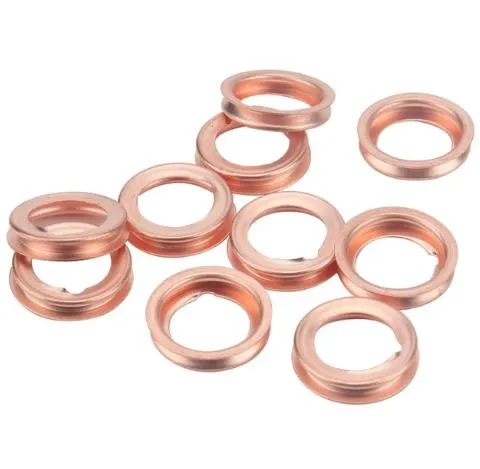The Rise of the Plastic Oil Drain Plug: Pros, Cons, and Best Practices
Modern automotive engineering has seen many changes over the years, and one notable shift is the increasing use of plastic oil drain plugs. While traditional metal drain plugs were once standard, many car manufacturers are now switching to plastic drain plugs for various reasons, including cost, weight reduction, and ease of use. This article explores the advantages, concerns, and maintenance tips surrounding the use of plastic oil plugs, helping car owners make informed decisions about this evolving component.

Why Are Plastic Oil Drain Plugs Becoming More Common?
The growing popularity of plastic oil drain plugs is not accidental. Car manufacturers are constantly seeking ways to improve vehicle efficiency and reduce production costs. Here's why plastic is gaining ground:
Lightweight and Cost-Effective
One of the main benefits of plastic drain plugs is their lightweight nature. When every ounce counts toward fuel efficiency, even a small part like the drain plug plastic can make a difference. Moreover, plastic components are often cheaper to produce than their metal counterparts, contributing to overall lower manufacturing costs.
Easier Maintenance and Tool-Free Removal
Many newer vehicles now come with tool-free plastic oil plugs, which are easier to remove and replace during routine oil changes. These plug designs usually feature a twist-and-lock mechanism, making the oil change process faster and more accessible for DIY enthusiasts.
Corrosion-Resistant
Unlike metal drain plugs, plastic oil drain plugs do not rust. This offers an advantage in vehicles frequently exposed to moisture, salt, or chemicals, as corrosion can lead to leaks and costly repairs over time.
Challenges and Risks Associated with Plastic Drain Plugs
Despite the advantages, there are several concerns and potential downsides to consider before fully embracing the plastic oil plug trend.
Durability and Strength
Metal drain plugs are known for their toughness, but drain plug plastic models can be more fragile. Over-tightening or improper installation can cause the plastic threads to strip or the plug to crack. This can lead to oil leaks and engine damage if unnoticed.
Heat Sensitivity
Plastic oil drain plugs are more sensitive to heat than metal ones. In high-performance engines or extreme environments, the plug can deform or wear out faster, reducing its effectiveness over time.
Compatibility and Limited Lifespan
Not all plastic oil drain plugs are universally compatible with every engine type or oil pan material. Additionally, while many plastic plugs are reusable for a few oil changes, they may require more frequent replacement than metal plugs.
Maintenance Tips and Best Practices for Plastic Oil Plugs
If your vehicle uses a plastic oil drain plug, or you're considering switching, it's essential to follow proper maintenance and usage guidelines to avoid problems.
Use the Manufacturer’s Recommended Parts
Always use plastic drain plugs that are specifically designed for your vehicle make and model. OEM (Original Equipment Manufacturer) parts are typically more reliable than generic replacements.
Avoid Over-Tightening
Unlike metal plugs that can handle high torque, plastic oil drain plugs are more delicate. Use a torque wrench when possible and follow the manufacturer’s recommended specifications to prevent cracking or thread damage.
Inspect During Every Oil Change
Make it a habit to inspect the plastic oil plug for signs of wear, such as cracks, warping, or thread damage. Replace the plug if any issues are found, even if it’s still technically reusable.
Consider Keeping a Spare
Given their lower durability, it’s wise to keep a spare drain plug plastic in your garage or car. This ensures you're not caught unprepared in case the plug fails during an oil change.
The transition to plastic oil drain plugs represents the broader movement in the automotive industry toward efficiency and innovation. While plastic drain plugs offer advantages in terms of weight, ease of use, and corrosion resistance, they also bring new challenges that car owners must consider. By understanding the pros and cons and following best practices, you can confidently maintain your vehicle whether it uses a traditional metal plug or a modern plastic oil plug.
Always remember: no matter the material, the drain plug plastic or metal, this small component plays a big role in keeping your engine protected and your vehicle running smoothly.
-
Seal 12x20x5: Precision Radial Shaft Seals for Industrial Reliability
Haberler Nov.24,2025
-
Seal 12x18x5: Essential Guide to Specifications, Applications & Vendors
Haberler Nov.24,2025
-
Understanding Seal 12 20 5: Applications, Specifications & Industry Insights
Haberler Nov.23,2025
-
Durable Oil Seal 85x110x12 – Reliable Sealing Solutions for Industry
Haberler Nov.23,2025
-
Durable and Precise Oil Seal 75x95x10 for Efficient Machinery | YJM Seal
Haberler Nov.22,2025
-
Durable Oil Seal 75x100x10 for Reliable Industrial Performance | YJM Seal
Haberler Nov.22,2025
-
High-Quality Oil Seal 65x90x10 | Durable & Reliable Sealing Solutions
Haberler Nov.22,2025
Ürün kategorileri















